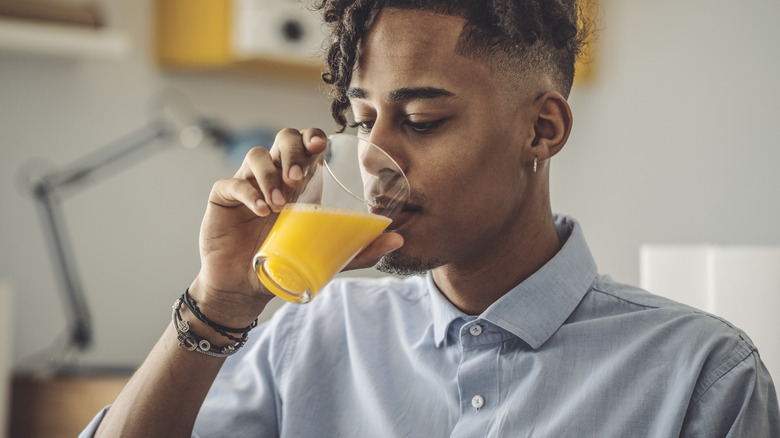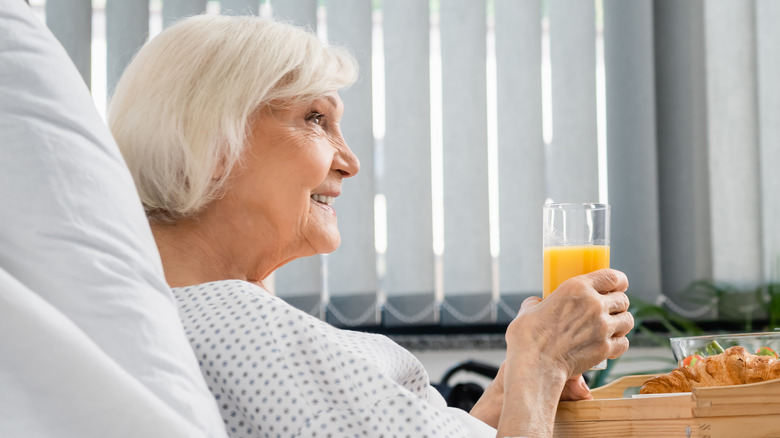
Orange juice is a common part of breakfast in many homes, and understandably so. As noted by Healthline, an 8-ounce glass of orange juice is loaded with various vitamins and minerals, such as vitamin C (which aids in boosting immunity and healing wounds), folate (important for DNA synthesis and breaking down red blood cells), potassium (a crucial electrolyte for regulating blood pressure and maintaining fluid balance, according to Harvard T.H. Chan School of Public Health), and a small amount of protein. Orange juice is also recognized for its high antioxidant content, its ability to prevent kidney stones by balancing PH levels, and its potential to improve heart health, as reported by Health.
Considering all these benefits, it’s no wonder you might crave it when you’re feeling stressed, unwell, or experiencing changes in your gut health. Learn more about food cravings and why you might specifically desire a glass of orange juice.
Stress can lead to orange juice cravings

Food cravings can arise for numerous reasons, such as boredom or deprivation. Erin Morse, chief clinical dietitian at UCLA Health, explained to WebMD, “Hunger is the need for food for fuel, for nutrition, for all the good things that our bodies and our brains need. [Cravings are] our bodies telling us that we want something to eat.” It turns out that craving a glass of orange juice might be your body’s way of signaling that it’s dealing with stress.
While orange juice is rich in vitamins and minerals, it’s also high in sugar, which quickly enters the bloodstream. During stress or chronic stress, this sugar rush can offer comfort, hence why sugary foods are often referred to as comfort foods. The desire for comfort foods like orange juice during stress is linked to increased cortisol and insulin levels, as noted by Harvard Health Publishing. Moreover, 2018 research published in Obesity found that stress enhances cravings and reward-driven eating and drinking due to elevated ghrelin levels, the hunger hormone.
Additionally, 2023 research in the International Journal of Molecular Sciences indicated that sugary drinks helped reduce stress in mice but also led them to binge eat. This suggests that stress likely contributes to sudden cravings for orange juice during demanding times (though moderation is key to avoid weight gain).
Sick bed cravings for orange juice

You woke up with a stuffy nose and fatigue. Suddenly, a craving for orange juice overwhelms you, and soon you’re gulping it down.
According to WebMD, the antioxidants in vitamin C are what your immune system desires when combating the common cold. For many, this is effective: About 8% of adults and 14% of children recover from colds faster when taking vitamin C daily. Researchers also found a 50% reduction in cold infection risk among those in peak physical condition (like marathon runners) who took vitamin C daily. As Dr. Silvia Robalino, a board-certified internal medicine doctor, told Health, “Vitamin C has a role in sustaining the integrity of the immune system and supporting the function of many immune cells.”
Your sick bed cravings might also stem from the added stress on your body and the desire for comfort food. While orange juice provides vitamin C, it might be the sugary sweetness or the soothing coolness on your dry tongue that drives the craving, according to Why PBS.
Orange juice cravings could be due to gut bacteria

Something feels different, and you’re drawn to sweet, sugary orange juice, yet you’re neither sick nor stressed. In this scenario, your craving may relate to your gut health.
Your body adapts to specific gut bacteria that aid digestion. Research published in BioEssays in 2014 suggests that each person’s unique gut microbiota can influence cravings and eating habits. For instance, high-carb diets might result in a lot of Prevotella in the gut, while certain fats encourage the growth of Bacteroidetes. These gut microbes can trigger food cravings and dissatisfaction to boost their own fitness, even if it’s not beneficial for you. Thus, your gut bacteria may prompt you to crave orange juice, while your sibling’s gut microbiota might cause a craving for chocolate.
While your gut might predispose you to crave orange juice, you don’t have to give in, as noted by The Conversation. Incorporating probiotics and prebiotics into your diet can help balance your gut microbiota and curb those cravings.




